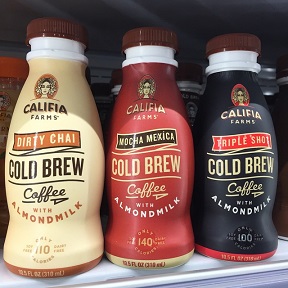As cold-brew coffee and kombucha continue to blossom in natural retailers, an uptick of exhibitors seen at the 2015 Winter Fancy Food Show, held earlier this week in San Francisco, signals a desire for brands in each category to take on a greater market presence via the specialty channel and beyond.
Califia Farms, which nearly a year ago extended its line of almond milk-infused, cold brew coffees with three single-serve varieties, is one such company. The products debuted at the 2014 Winter Fancy Food Show, and like their multi-serve counterparts, the 10.5 oz. bottles call out the cold brew formulation of the coffee near the top of their labels. However, unlike the expanding set of cold-brewed coffee products that have hit the market over the past 12 months, it’s the mainstream-friendly “Iced Coffee” that is front and center on the package.

However, Steltenpohl said that natural channel sales data from the past six months has shown that “cold brew is worth paying attention to” and that conventional grocers, like Safeway and Kroger, are now clamoring for a piece of the growth.
“Retailers are opening up to differentiation where there is a story to tell,” Steltenpohl said. “And they don’t want natural retailers to have such a long lead time [for trends]. They just want to participate.”
Steltenpohl pointed out that the development of cold-brewed coffee as a trend had been hampered by the astounding rise of iced coffee sold multiservice packages, in particular, those marketed by International Delight. Consumers, however, are increasingly seeking out natural and premium coffee options, and pointed to a decline in sales of large-format products, particularly those made with artificial ingredients and preservatives (which is the case with International Delight’s offerings) as a clear indication of the trend.
The new-look Califia Farms coffee products, having replaced “iced coffee” with “cold brew,” also come with new flavor varieties, each tinged with edgy-sounding names: Dirty Chai, Mocha Mexica and Triple Shot. Steltenpohl said that the drinks are scheduled for an April launch.

Grady’s co-founder Dave Sands said that the bean bags canisters have also gained retail placement in 300-400 grocery accounts, and while velocity has not been as dynamic as that of its liquid concentrates, the product has gained praise from retailers and consumers who enjoy the versatility and portability of coffee bags. As for Grady’s primary offering, a 32 oz. bottle of its concentrate, the company recently landed shelf space at all Whole Foods locations in the retailer’s Southwest region. The product will be available by March or April, Sands said, and will be distributed by UNFI, which Grady’s has brought on as a wholesaler of the concentrate.
On the kombucha front, this year’s edition of the Winter Fancy Food Show featured two first-time exhibitors — Revive and Health-Ade — and one returnee — Kombucha Wonder Drink. Despite a sustained lack of awareness and education about kombucha (Revive founder Sean Lovett estimated that “what is kombucha?” represents about 50 percent of questions about his products), brand representatives reported steady traffic at their respective booths, much of it coming from retailers attending the event.
Amid a challenging transition in which the company lost its DSD distribution partner for Southern California and the Rocky Mountain regions, Revive is nonetheless on track to open a new production facility in June and build out its retail presence along the West Coast.

Lovett expects UNFI to be an integral part of Revive’s plan to expand distribution to the Pacific Northwest and other pockets in California where the brand has yet to gain a foothold. Just as critical will be upgraded production and bottling equipment, which is set to be operational this summer. Lovett said that filling Revive’s swing-top bottles will be a much more automated process; the bottles are currently sealed by hand. And while Revive will likely need less manual support for production of its kombucha, Lovett expects that the company will nonetheless see its staffing swell from 23 employees to approximately 40 by the end of the year.
Another fast-growing kombucha brand, Health-Ade, is making waves with a series of impressive wins in conventional retailers. The company recently gained distribution in 400 Safeway and Vons locations across Northern and Southern California. Scott Goldstein, the company’s Director or Sales-West, noted that the grocery giant has reorganized some of its juice sets to fit new and emerging brands, including Health-Ade.
Packaged in amber-colored, apothecary-style bottles, Health-Ade retails for $4.99 per 16 oz. package, with a $3.99 price point when sold on promotion. Goldstein said that the company would rely heavily on product demos for the Safeway launch, as it will for retail locations in New York, where the brand is set to make its East Coast debut, having recently signed an agreement with Rainforest Distribution for coverage in the region.